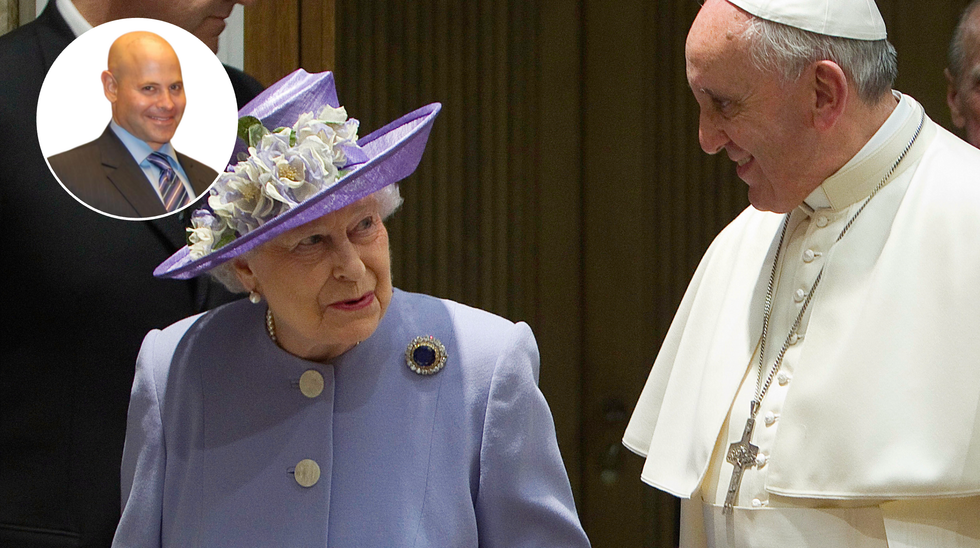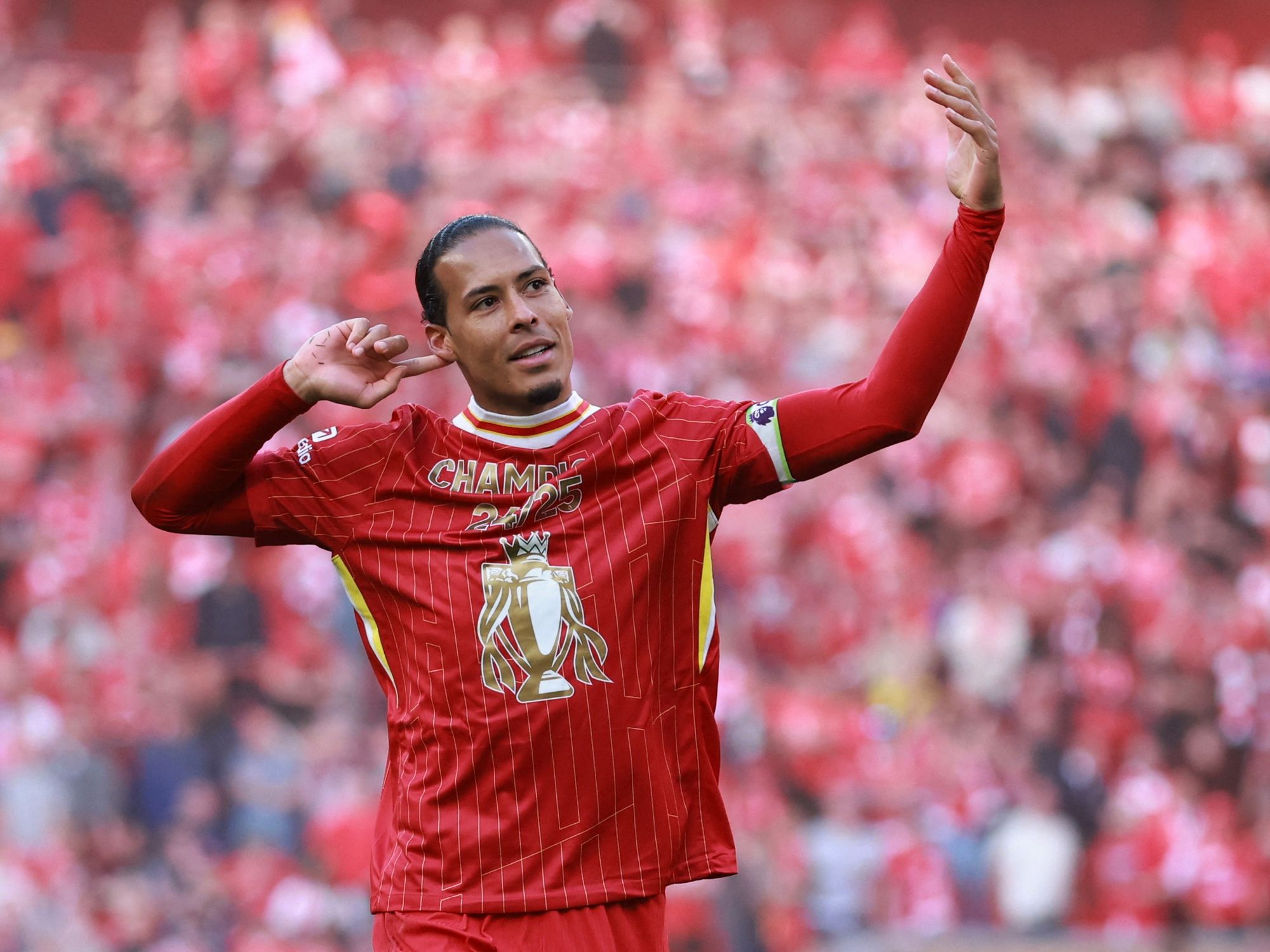Alexander Larman says the Pope's funeral could be a 'wake-up call' for Prince William
GB News
OPINION: Without a revival of Christian values and national pride, Europe risks fading into a shadow of its past
Don't Miss
Most Read
Latest
Guardian and New York Times readers will choke on their soy lattes to read someone of Jewish heritage state this, but here comes the truth bomb: To halt its alarming decline, the West must rediscover and prioritise its Christian foundations without which it is spiralling into destruction.
The death of Pope Francis last week and his funeral Saturday, following Queen Elizabeth II’s passing in 2022, have stripped Europe of two pillars of faith who tethered the West to its Christian heritage. This fragile foundation now buckles under economic stagnation, uncontrolled mass immigration, and a self-hating cultural malaise driven by woke ideologies. Europe’s crisis is self-inflicted, born of cowardly nations abandoning moral clarity for self-destructive lunacy. T
To survive, the West must revive its Christian roots and restore the nation-state, as championed by MAGA, Brexit, and Europe’s rising patriotic movements.
The loss of Pope Francis, a global advocate for Christian values, and Queen Elizabeth II, an emblem of Anglican faith and duty, leaves us even further exposed.The Queen’s 70-year reign embodied steadfast resilience, grounding Britain in tradition through decades of upheaval.
Francis, despite divisive stances, upheld the Church’s moral authority, countering secular relativism. Their deaths leave a spiritual void that political champions of Christian heritage, like Donald Trump or Viktor Orban, cannot fully bridge.
This vacuum amplifies Europe’s broader decline, where economic weakness, cultural erosion, and demographic shifts threaten its survival.

With no Queen Elizabeth II and Pope Francis, only one thing can save Europe. Are you ready for the fight? - Lee Cohen
Getty Images
Europe’s economies are in disarray. Germany, the EU’s industrial heart, faces recession, crippled by soaring energy costs and bureaucratic overreach. France’s debt-to-GDP ratio nears 110 per cent, while Italy’s economy stagnates. The Eurozone trails the United States, where Trump’s deregulation will deliver. Europe’s welfare states, strained by ageing populations, are unsustainable, yet leaders shrink from reform, dreading popular backlash. This economic cowardice mirrors a deeper failure to confront the cultural and demographic transformations reshaping the continent.
Mass immigration, particularly from Muslim-majority countries, is fundamentally altering Europe’s cultural and demographic fabric, often without public consent or effective integration. In 2022, net migration to the EU reached 2.7 million, with significant inflows from North Africa and the Middle East. Cities like Malmö, Brussels, and parts of London now host enclaves where parallel communities thrive, sometimes clashing with host cultures. Sweden’s violent crime has surged, with gang violence and grenade attacks linked to unassimilated migrant groups.
The 2015 migrant crisis, when over a million entered Europe, exposed the EU’s porous borders and incoherent policies. Yet, leaders like Angela Merkel championed open-door policies, branding dissent as bigotry. This betrayal has shattered trust, fueling social division.
The erosion of European identity worsens this crisis. Multiculturalism, sold as progress, often demands the suppression of native traditions to accommodate newcomers. In the UK, debates over toppling “offensive” statues or rewriting history curricula reflect a self-flagellating guilt over colonialism, amplified by intellectual frameworks like critical race theory and postcolonialism. These ideologies, peddled by academics and activists, paint Europe’s history as unrelenting oppression, dismissing its contributions to democracy, science, and individual liberty. The result is a continent ashamed of its past, unwilling to defend its values or assert its heritage.
The peerless Douglas Murray, in his most recent writings, calls this an internal war—a self-inflicted wound. Europe’s failure to address immigration, integration, and economic decline risks not just cultural dilution but political collapse. The rise of patriotic parties—Reform UK, France’s National Rally, Hungary’s Fidesz—reflects a public desperate for leaders who prioritise sovereignty and identity over apology. Brexit, a bold rejection of Brussels’ technocracy, embodied this spirit, as does Trump’s 2024 return, a defiance of globalist elites. Yet, these movements falter without the moral clarity, underpinned by Christian faith, once provided by figures like the Queen and Pope Francis.
Christianity forged the West’s moral, artistic, and legal foundations, shaping milestones from the Magna Carta to the Enlightenment. Its values—charity, community, resilience—are unified nations. Yet, church attendance has plummeted: only 22 per cent of Britons and 10 per cent of French regularly attend services. This spiritual hollowing-out leaves societies prey to divisive ideologies exploiting guilt. A Christian revival doesn’t mean theocracy but a renewed recognition and embrace of principles that anchored the West. The Queen and the Pope personified these; their void must somehow be filled.
The nation-state, not only championing but recognising the matchless ethics of Christianity that enabled the ascendance of the West, must also be restored as the cornerstone of governance. Only this could properly address the self-hating, virtue-signalling rot inherent in the wokeness of globalist movements, like the EU, that ignore cultural distinctions. Brexit proved sovereignty’s value; Hungary and Poland’s resistance to EU migration quotas shows national resolve. Leaders must prioritise their citizens, securing borders and fostering integration that respects host cultures. Economic reforms—deregulation, tax cuts, energy independence—can spark growth, but only alongside cultural confidence.
Europe teeters on the brink. The deaths of Queen Elizabeth II and Pope Francis have left a spiritual chasm, but Brexit, patriotic parties, and Trump’s defiance offer hope. Without a revival of Christian values and national pride, Europe risks fading into a shadow of its past—a civilisation that chose self-destruction over self-defence. The time for cowardice is over. Europe must embrace its Christian heritage, secure its future, and prove it remains worthy of its history.












